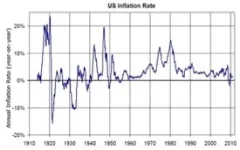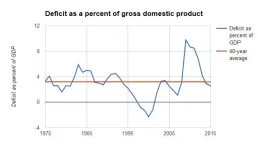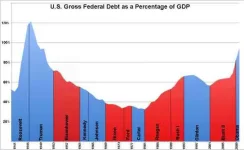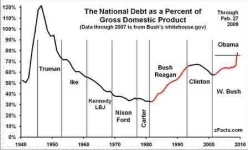Why? Ignore for a moment debt as percent of GDP was higher coming out of WW2, the fact of the matter is total debt is a completely misleading figure. A VERY high percentage of our debt is to ourselves. It is debt we knowingly and intentionally claimed, to protect the interests of Americans. As for the foreign debt, the US currency is still the world leader and that gives us economic power which most countries do not have.
I know personal debt is bad, but governmental debt is just different and given the United States standing in the world, the fact the debt as % of GDP is still decreasing may be something to keep an eye on, but it's not something to be overly concerned with.
... and with the OP news I get concerned about the trend line shifting back upwards telling me that we will not get below Total Debt being above 100% of GDP anytime soon.
The OP comes from a fear mongering website. They are constantly and consistently trying to cast most economic news in a very negative light, at least that's what I gather from all the Zero Hedge articles which get posted on this forum. I don't know why they try to scare people about the economy, but they do.
The fact of the matter is reporting on the first month of the fiscal year and claiming debt soared can be misleading for so many reasons. For example (and this is just speculation, since I'm not going to go back and read the article), with it being the first couple months of the fiscal year, it makes a lot of sense that the government would have expenditures...but taxes aren't due until next April. So, obviously, the government is spending money they don't currently have, with the understanding they will make it back.
That's just one example. I didn't read the article and I'm not going to (for reasons mentioned) so I don't know where they came up with their numbers. But, being the fairly rational and intelligent poster you are, just remember to keep the source in mind before getting scared. The fact of the matter is the deficit this year is expected to be under $500 billion (something close to FY2015, if I'm not mistaken).
Good ole Sly...the Obamabot who keeps putting lipstick on pigs.
Good ole, DA, the one who is constantly proven wrong by pinqy and mmi with those pesky things called "facts", which so do get in the way of your "the sky is falling" narrative.
The deficit is over 2 1/2 times worse then it was before the Great Recession.
And, when injusted for inflation, right in line with where it was in 2003 and 2004 and lower as a percent of GDP. Furthermore, it has decline by nearly $1 trillion since FY 2009.
https://www.whitehouse.gov/omb/budget/Historicals
History of Deficits and Surpluses In The United States
Don't you just hate when facts get in the way of your "the sky is falling" narrative?
Saying it is better then the absolutely ridiculous deficits that have been run by Bush/Obama since then is like defending yourself at a murder trial by claiming that you murdered less people then the last mass murderer.
And trying to ignore a great worldwide economic collapse is more ridiculous than trying to ignore the 9/11 attacks in New York when talking about terrorism in the United States.
What's your point? Nevermind, I already know what your point is...the sky is falling. Enjoy your asinine Zero Hedge articles.
So who is correct here? Is the $439B deficit the lowest in 8 years? or the highest?
The eight years part, from the source, might have been poor counting. The FY2015 deficit, when adjusted for inflation, is the lowest since FY2007, so however many years that is, last year was the lowest.
Slyfox's quote indicates an 8-year downward trend, and Eric says exactly the opposite, that it's been on the rise for 8 years.
This is why people hate politics.
It's not that hard really. Fiscal years run from October to September (I believe). FY 2008 ended in October 2008. You might remember a very significant event happening in the last half of 2008 and into 2009.







